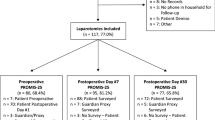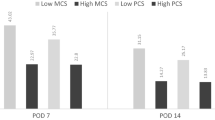Abstract
Background
Often in clinical practice, a spectrum of outcomes from surgery may be observed ranging from a quick and comfortable recovery to a recovery punctuated by persistent pain and decreased quality of life. While there has been a fast pace of advances made in the field of operative surgery, surgeons seldom pay attention to factors such as the psychological profile of a patient that can affect recovery from surgery.
Objective
To study the effects of pre-operative psychological profile on post-operative recovery in terms of pain, return to work and quality of life.
Materials and methods
Consecutive patients undergoing laparoscopic surgeries at Sagar Hospitals, Jayanagar, were recruited. All patients were assessed for psychological status using the screening for illness behaviour questionnaire (SIBQ) and pain catastrophizing scale (PCS). Following surgery, they were followed up for a period of 3 months—on post-operative day 1, post-operative day 7, 1 month and 3 months from the date of surgery. Post-operative pain was measured using the visual analogue scale (Wong–Baker’s), return to work was documented in days and quality of life was measured using the Short Form-36 version 2 (SF-36v2) Health Survey. The Pearson’s correlation coefficients were used to compare variables with continuous data and Chi-square and Fisher’s tests were used to test categorical data for significance.
Results
In a total of 98 patients recruited, 50 patients had a complete follow-up of 3 months. Significant correlations existed between the pre-operative markers and markers of recovery. The Chi-square test and Fisher’s exact tests showed significant differences in the scores of pre-operative markers between the groups of patients who developed chronic pain and those who did not. Difference in scores with regard to quality of life was also noted.
Conclusion
Psychological status does play a role in post-operative recovery. This result opens up scope for counselling patients towards a healthy and comfortable recovery from surgery.
Similar content being viewed by others
References
Kiecolt-Glaser JK, Page GG, Marucha PT, MacCallum RC, Glaser R (1998) Psychological influences on surgical recovery-perspectives from psychoneuroimmunology. Am Psychol 53(11):1209–1218
Mavros MN, Athanasiou S, Gkegkes S, Polyzos KA, Peppas G, Falagas ME (2011) Do psychological variables affect early surgical recovery? PLoS ONE 6(5):e20306. doi:10.1371/journal.pone.0020306
Tracy I, Mantyh PW (2007) The cerebral signature of pain perception and its modulation. Neuron. doi:10.1016/j.neuron.2007.07.012
Coghill RC (2010) Individual differences in the subjective experience of pain: new insights into mechanisms and models. Headache 50(9):1531–1535
Apkarian AV, Bushnell MC, Treede RD, Zubieta JK (2005) Human brain mechanisms of pain perception and regulation in health and disease. Eur J Pain 9:463–484
Bruns D, Kerns RD (2014) Managing chronic pain. American Psychological Association. https://www.apa.org/health/briefs/primary-care.pdf
Johnston M, Voegele C (1993) Benefits of psychological preparation for surgery: a meta-analysis. Ann Behav Med 15:245–256
Rosenberger PH, Jokl P, Ickovics J (2006) Psychosocial factors and surgical outcomes: an evidence-based literature review. J Am Acad Orthop Surg 14:397–405
Pignay-Demaria V, Lespérance F, Demaria RG, Frasure-Smith N, Perrault LP (2003) Depression and anxiety and outcomes of coronary artery bypass surgery. Ann Thorac Surg 75:314–321
Mumford E, Schlesinger HJ, Glass GV (1982) The effects of psychological intervention on recovery from surgery and heart attacks: an analysis of the literature. Am J Public Health 72:141–151
Anderson KO, Masur FT (1983) Psychological preparation for invasive medical and dental procedures. J Behav Med 6:1–40
Hanusch BC, O`Connor DB, Scott A, Greg PJ (2014) Effects of psychological distress and perceptions of illness on recovery from total knee replacement. Bone Jt J 96(B(2)):210–216
Chaturvedi SK, Bhandari S, Beena MB, Rao S (1996) Screening for abnormal illness behaviour. Psychopathology 29(6):325–330
Sullivan MJL (2009) Pain catastrophising scale –user manual, 5th edn. McGill University, Montreal
Wong DL, Hockenberry-Eaton M, Wilson D, Winkelstein ML, Schwartz P (2001) Wong’s essentials of pediatric nursing, 6th edn. Elsevier, St. Louis, p 1301
Ware JE Jr., Sherbourne CD (1992) The MOS 36-item short-form health survey (SF-36). I. Conceptual framework and item selection. Med Care 30(6):473–483
McHorney CA, Ware JE Jr., Raczek AE (1993) The MOS 36-Item Short-Form Health Survey (SF-36): II. Psychometric and clinical tests of validity in measuring physical and mental health constructs. Med Care 31(3):247–263
McHorney CA, Ware JE Jr., Lu JF, Sherbourne CD (1994) The MOS 36-item Short-Form Health Survey (SF-36): III. Tests of data quality, scaling assumptions, and reliability across diverse patient groups. Med Care 32(1):40–66
Zonderman AB, Heft MW, Jr. Costa P T (1985) Does the illness behaviour questionnaire measure abnormal illness behaviour? Health Psychol 4(5):42536
Entwistle VA, Carter SM, Cribb A, McCaffery K (2010) Supporting patient autonomy: the importance of clinician–patient relationships. J Gen Intern Med 25(7):741–745
Gulati A, Herd MK, Nimako M, Anand R, Brennan PA (2012) Litigation in national health service, oral and maxillofacial surgery: a review of the last 15 years. Br J Oral Maxillofac Surg 50(5):385–388
Johnston M, Fitzgerald JEF, Bhangu A, Wild J (2013) Consent-related litigation claims in general surgery: a retrospective analysis of 16 years of NHS litigation authority malpractice cases. Int J Surg 11:589–685
Zgaia A, Pop F, Irimie A, Rogobete A, Achimas-Cadariu P et al (2016) The impact of relaxation technique and pre-operative psychological counselling in pain, analgesic consumption and psychological symptoms on patients scheduled for breast cancer surgery—a randomised clinical study. J Evid Based Psychother 16(2):205–220
Callaghan P, Li HC (2002) The effect of pre-operative psychological interventions on post-operative outcomes in Chinese women having an elective hysterectomy. Br J Health Psychol 7:247–252. doi:10.1348/135910702169475
Author information
Authors and Affiliations
Corresponding author
Ethics declarations
Conflict of interest
Dr. Ajay Raghunath Aspari and Dr. K. Lakshman declare that they have no conflict of interest or disclosures.
Informed consent
Informed consent was obtained from all individual participants included in the study.
Rights and permissions
About this article
Cite this article
Aspari, A.R., Lakshman, K. Effects of Pre-operative Psychological Status on Post-operative Recovery: A Prospective Study. World J Surg 42, 12–18 (2018). https://doi.org/10.1007/s00268-017-4169-2
Published:
Issue Date:
DOI: https://doi.org/10.1007/s00268-017-4169-2




